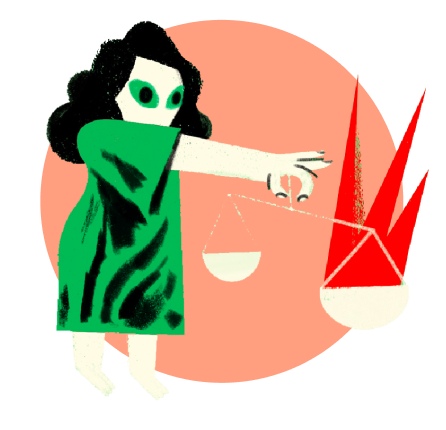When we talk about digital rights, we refer to human rights in the digital spheres. There is a tendency to think that online and offline spaces are separate spaces, but we have already seen that they are fully related and constantly affect each other. Therefore, no new rights are created from the digital, but rather pre-existing fundamental rights apply equally in these spaces.
By not having free access to ICTs and the digital ecosystem, digital rights for full development such as the right to freedom of expression, the right to privacy, the right to information, sexual and reproductive rights and the right to non-discrimination are lost. That is, any woman or girl with or without access to technology is exposed to be a victim of this type of violence, which has a direct impact on the ability of empowerment or equality for women.
Some of the digital rights are:
The right to live free of gender-based violence

According to Article 1 of the Convention of Belém do Pará, technology- facilitated gender-based violence against women and girls is defined as any act or behavior based on gender that causes death, physical, sexual, psychological, economic or symbolic harm. This violence can be committed, instigated, or exacerbated, in whole or in part, through the use of information and communication technologies, which expands its scope and severity in the digital environment. An updated interpretation of Articles 3 and 6 of the Convention of Belém do Pará establishes that women have the right to live free from violence in their online interactions, both in public and private spaces. This right includes protection against discrimination on the Internet, recognition free from gender stereotypes, and the obligation of States not only to prevent actions that violate this right but also to implement positive measures to ensure that women and girls can fully exercise it in digital spaces.
Since 2017, the Committee of Experts of the Follow-up Mechanism of the Convention of Belém do Pará (MESECVI), in its Third Hemispheric Report on the Implementation of the Convention of Belém do Pará, has recognized the right of women to a life free of violence facilitated by new technologies. This recognition aligns with General Recommendation No. 35 of the CEDAW Committee, which notes that violence against women also manifests in digital environments, redefining the boundaries between the public and the private.
Furthermore, in 2018, the RELE stated that violence through electronic media is a form of gender discrimination that States must address as part of their obligations under the American Convention on Human Rights.
The right of women and girls to live free from violence in digital environments has also been recognized by the United Nations System. This right has been referenced in resolutions by the General Assembly and in reports from the Human Rights Council, reinforcing the need to protect women and girls in digital spaces as part of global efforts to eradicate gender-based violence.
The right to freedom of expression and access to information
Technology-facilitated gender-based violence (TFGBV) not only constitutes a violation of their fundamental rights, but also restricts their freedom of expression, a right recognized in Article 13 of the American Convention on Human Rights (ACHR) and Article 19 of the International Covenant on Civil and Political Rights (ICCPR). This right includes the ability to seek, receive, and disseminate information and ideas freely on the Internet without censorship or other interference.
The Internet has become a key tool for political, social and economic development, enabling people to access information, participate in decision- making processes and exercise their rights. It also facilitates women's access to resources that enable them to make informed and autonomous decisions regarding their bodies, lives and health, including sexual and reproductive health and reproductive rights. However, online gender-based violence prevents many women from fully exercising these rights, generating self-censorship and reducing their participation in the digital space. The RELE has emphasized that access to the Internet "constitutes a sine qua non condition for the effective exercise of human rights today", including freedom of expression, opinion, association and education. However, online violence has created a "chilling effect on the exercise of freedom of expression", limiting the presence of women's voices in the media and reinforcing gender inequality.
This situation has serious consequences not only for the affected women but also for society as a whole. The absence of women in public debate "undermines the social dimension of the right to freedom of expression", weakening democratic deliberation and good governance. The UN Special Rapporteur on Violence against Women has warned that this situation generates "a society in which women no longer feel safe online or offline, due to widespread impunity for perpetrators of gender-based violence".
TFGBV also exacerbates the gender digital divide, as many women withdraw from online spaces due to intimidation and harassment.This not only affects their right to information, but also negatively impacts their access to economic opportunities and digital literacy. Additionally, it restricts their ability to access information on "sexual and reproductive health, while respecting confidentiality and eliminating stigma-related barriers". Certain groups of women are particularly affected by this situation, such as activists, human rights defenders, journalists, and politicians, who greatly rely on ICT for their work. In this regard, the United Nations High Commissioner for Human Rights has emphasized that States "have an obligation to combat violence against women online and to protect freedom of opinion and expression". To achieve this, it is essential to adopt effective measures to ensure a safe and inclusive digital environment for all women.
The right to privacy and personal data protection
The right of women and girls to privacy, recognized in Article 11 of the ACHR nd Article 17 of the ICCPR, is also threatened by online violence. Practices such as surveillance, control of personal accounts, non-consensual sharing of intimate images, and cyberbullying disproportionately affect women, limiting their autonomy and security in digital spaces. The Inter-American Court of Human Rights has noted that the concept of private life is a broad term not susceptible to exhaustive definitions, but which includes, among other protected areas, sexual life and the right to establish and develop relationships with other human beings.
In this regard, the right to privacy on the Internet implies the possibility of using tools such as data encryption, anonymity or the use of pseudonyms in social networks in order to minimize the risk of interference in private life. This is especially relevant for women human rights defenders and women seeking information considered taboo in their societies.
Anonymity and encryption can contribute to the full enjoyment of individuals' rights, including the rights to freedom of opinion and expression, and to privacy, in accordance with international law. The MESECVI has warned that women's right to privacy is under threat due to mass digitization and the use of surveillance technologies. Furthermore, surveillance and collection of personal data particularly impact women due to structural discrimination. The lack of privacy in digital spaces reinforces the notion that women need to be controlled, which amplifies their vulnerability and exposure.
The right to assembly and freedom of association
TFGBV also affects women's right to assembly and freedom of association, which are protected by Article 4(h) of the Convention of Belém do Pará, Articles 15 and 16 of the ACHR, and Articles 21 and 22 of the ICCPR. These rights must be guaranteed "regardless of whether they are exercised in person, through contemporary technical means, or with those that may be invented in the future".
Women have the right to use the Internet to associate freely and develop activities with a lawful purpose without pressure or interference that would alter their purpose. This includes the ability to choose digital platforms to mobilize, protest, and participate in debates on public policy and legislative initiatives. As highlighted by the UN Special Rapporteur on the rights to freedom of peaceful assembly and association in his 2012 report, the Internet and social media have become fundamental tools for exercising these rights, which are essential to other civil, cultural, economic, political and social rights.
For women and girls, who have historically been marginalized from public spaces, the Internet has been key to advancing the feminist movement and exposing gender-based violence. Examples of this include the #MeToo, #NiUnaMenos, #MiPrimerAcoso and #PrimeiroAssédio movements, which have successfully amplified reports of abuse and combined online and offline activism.
However, further research in the region has shown that women are exposed to new forms of TFGBV such as the dissemination of sexualized images, disinformation aimed at damaging their reputation, threats of sexual violence and femicide, and doxxing. These attacks impact their ability to gather and build virtual communities, undermining their visibility and participation in public life. As a result, many women are forced to leave the digital space, which not only affects their safety, but also limits their access to support networks and counseling. In light of this reality, States must adopt effective measures to protect women and girls from online gender-based violence, fulfilling their obligation to prevent, investigate, punish, and remedy these acts, thereby ensuring the full exercise of their rights to freedom of assembly and association in the digital environment.
The right to personal integrity
TFGBV violates the right of women and girls to physical, psychological and moral integrity, as protected by Article 4(b) of the Convention of Belém do Pará and Article 5 of the ACHR. These rights guarantee that women are treated with dignity and are not subjected to torture or cruel, inhuman or degrading treatment or punishment. The effects of TFGBV can lead to serious short and long-term consequences for victims, impacting their individual development. Beyond psychological harm, physical repercussions stemming from online violence have also been documented. The right to physical integrity can be compromised when attacks such as doxxing lead to offline violence or when the non-consensual dissemination of intimate images causes such extreme levels of revictimization that they may drive the victim to suicide.
The MESECVI has recognized that violations of the right to physical and psychological integrity take various forms, ranging from torture to other cruel, inhuman, or degrading treatment, with consequences that vary in intensity depending on multiple factors.
In light of this reality, it is essential for States to acknowledge the impact of online gender-based violence and adopt effective measures to prevent, punish and remedy these acts, ensuring the protection of women's and girl's physical and psychological integrity.
Other human rights
TFGBV can also lead to the violation of other fundamental rights, including:
The right to personal freedom and security
Recognized in Article 4(c) of the Convention of Belém do Pará. Digital attacks against women and girls affect their ability to organize their personal and social lives according to their own beliefs and decisions. According to the CEVI this right entails each individual's capacity to self-determine and freely choose the circumstances that give meaning to their existence.
The right to respect for honor and recognition of dignity
Established in Article 11 of the ACHR and Article 17 of the ICCPR. This protection aims to prevent the dissemination of false information or the non-consensual publication of intimate images and videos that may damage women's reputations and limit their social participation, reinforcing gender stereotypes about sexuality.
Violations of sexual and reproductive rights and the right to sexual freedom
In terms of sexual autonomy, in cases of non-consensual dissemination of intimate images. These acts of violence tend to generate a permanent re-victimization by society, punishing women for the free exercise of their sexuality.
The right to freedom of movement
Established in Article 22 of the ACHR and Article 12 of the ICCPR. This right is impacted when a woman is a victim of doxxing or receives threats of physical harm, death, or sexual violence, forcing her to change her residence or limit her mobility out of fear of retaliation.
The right to protection against labor discrimination based on gender
Established in Articles 3 and 6 of the Additional Protocol to the ACHR and Articles 6 and 7 of the International Covenant on Economic, Social and Cultural Rights. This happens when a victim loses their job or a job opportunity due to online attacks that damage their reputation, such as the spread of false information.
The right to access to justice
Recognized in Articles 8 (judicial guarantees) and 25 (judicial protection) of the ACHR. TFGBV often lead to the systematic denial of justice, omissions in due process, and judicial obstacles to identifying and punishing those responsible, preventing a comprehensive remedy for victims.
Tension between rights
The fight against TFGBV presents tensions between human rights, heightened by abusive government restrictions on the Internet. The conflicting rights include freedom of expression, privacy and the right to live free from violence. Often, the balance of these rights is struck without a proper gender perspective, leading to the prioritization of some over others. Although human rights are interdependent and indivisible, their exercise is not absolute and may be subject to legal, necessary and proportional restrictions (ACHR, UNESCO). In practice, TFGBV tends to be considered less of a priority compared to other rights. UNESCO has noted the lack of a gender perspective in these debates and the need to acknowledge women's experiences to inform more equitable policies. It has been shown that technology is used to control and silence women, perpetuating gender discrimination both online and offline. This contributes to their marginalization and limits their access to the benefits of ICTs.
Article 13.5 of the ACHR prohibits advocacy of hatred that incites violence, including online hate speech directed against women. The RELE has established that in order to criminalize such speech, it must be public, represent a real and imminent danger, and demonstrate intent to harm. While freedom of expression is fundamental in a democracy, its exercise carries responsibilities, allowing for narrowly defined restrictions to prevent hate speech and violence.
The Inter-American System for the Protection of Human Rights has developed a "tripartite test" to evaluate the validity of restrictions on freedom of expression: these must be clearly defined by law, necessary in a democratic society, and proportional to the intended objective. Any restriction must be ordered by a competent judge and respect due process (RELE).
In exceptional cases, measures to block and filter illegal content are allowed, as long as they are specific, proportional, and under judicial oversight. They must have safeguards against abuse, ensure transparency and be the only option available for a legitimate objective. States have the obligation to guarantee equal access to rights on the Internet (Convention of Belém do Pará, art. 8 (g)),which includes promoting content guidelines that help eradicate violence against women and girls. The lack of response to online violence legitimizes these behaviors and fosters impunity. The IACHR Rapporteurship has urged States to prohibit hate speech that incites violence and to ensure a safe and inclusive digital environment with a gender perspective. For expressions that do not directly incite violence, the application of non-criminal sanctions, such as economic reparations or alternative measures, is recommended.

